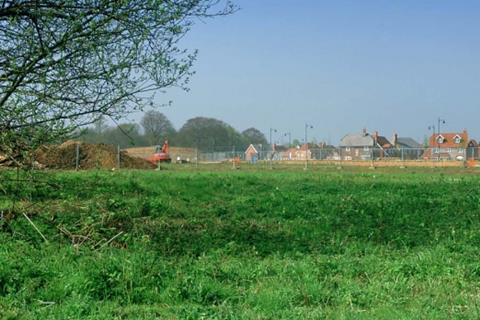ŌĆśNo-one can live in a planning consentŌĆÖ, says RICS, as new planning consultation is launched

Trade organisations have given a cautious welcome the governmentŌĆÖs latest planning proposals but warned that more needs to be done to speed up the delivery of desperately needed new homes.
The government announced its last week, with communities secretary Sajid Javid claiming it would ŌĆ£help local areas have an open conversation about the number of new homes needed, and make sure we build more houses in the places they are needed to provide for a growing populationŌĆØ.
RICS Parliamentary affairs manager Lewis Johnston said that while the proposals were welcome ŌĆō as they aimed to ŌĆ£better align planning assessments with the real housing requirements of local communitiesŌĆØ ŌĆō he also warned that ministers needed to recognise the need to speed up housebuilding activity.
ŌĆ£The overriding objective of the governmentŌĆÖs housing policy has to be getting more homes delivered on the ground. While welcome, ultimately these proposals will only be effective if they succeed in breaking the logjam around delivery.
ŌĆ£Both the volume and speed of housebuilding in the UK need to be increased if we are to address the chronic gap between demand and supply.
ŌĆ£Nobody can live in a planning consent, and the focus for government should be fulfilling its White Paper commitment to empower a greater range of developers to increase their supply of homes. This means providing more support for SME builders, and lifting the borrowing cap so local authorities can borrow against future revenue streams to build.ŌĆØ
The Country Land and Business Association (CLA) called on the government to ŌĆśrural proofŌĆÖ its latest planning proposals, in order to protect rural communities across the country.
It said while it welcomed the proposals to assess housing need, it argued it was ŌĆ£crucial that housing delivery is ŌĆśrural proofedŌĆÖŌĆØ.
CLA housing adviser Matthew OŌĆÖConnell said rural communities had not been able to grow organically and incrementally for many years, ŌĆ£and as a result local people are unable to afford to live in the areas they have grown up in.
ŌĆ£As rural landowners and local employers, CLA members would like to see greater clarity on the need for small-scale incremental development in rural communities, in addition to greater clarity on housing need.ŌĆØ
Proposals in the Housing White Paper published earlier this year outlined that at least 10% of the sites allocated for residential development in local plans should be sites of half a hectare or less, a strategy supported by the CLA, and described by OŌĆÖConnell as ŌĆ£a sensible step that will help rural areas grow proportionatelyŌĆØ.
Another part of the governmentŌĆÖs proposals, an eight-week consultation for which kicked off last week, will require local councils to work together ŌĆ£to plan for homes and supporting infrastructure, such as roads and utility servicesŌĆØ.
Councils would need to work with their local communities ŌĆ£to take account of green belt and any other constraints, discuss with adjoining councils, and decide how many homes they can build, and whereŌĆØ.
The Home BuildersŌĆÖ Federation said it welcomed the governmentŌĆÖs move and the groupŌĆÖs planning director Andrew Whitaker added: ŌĆ£We would say that the announcement is generally very positive.
ŌĆ£There are still a lot of details to work out about what it actually means in practice, but overall the focus on putting robust plans in place and keeping them up to date is good news for the industry.ŌĆØ


























No comments yet